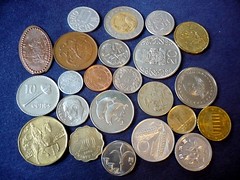Bitcoin is a digital currency that was launched in 2009 by Satoshi Nakamoto — and that’s likely not his real name.
I recently began reading about Bitcoin here and there over the past month, including a rather fluffy piece on it in MIT’s Technology Review. I was reminded about it again during the PowerPoint Karaoke session late last week. So I decided to finally look a little harder at it.
At first, I couldn’t tell whether it’s something to anticipate or something to avoid. After a little research, my opinion is much clearer.
Bitcoin isn’t like PayPal, which is a popular and secure way to electronically transfer money. Bitcoin is an attempt at creating a virtual currency — money without a clear economic basis. This fact alone appeals to some of its proponents while causing critics to scoff and issue dire warnings.
To use Bitcoin, you need a Bitcoin address, which also creates a wallet based on public key encryption. Because Bitcoin is decentralized and uses a peer-to-peer architecture, it has been “championed by cyberpunks, libertarians and anarchists who dream of a distributed digital economy outside the law, one where money flows across borders as free as bits.”
In one particularly breathless and widely circulated blog post issued recently by Rick Falkvinge, entitled “Why I’m Putting All My Savings Into Bitcoin,” the reasons offered for rapid adoption are:
- Bitcoin has performed well in its admittedly brief recent history.
- It’s easy to install and use.
- A lot of people will adopt it.
- The peer-to-peer architecture protects it from being easily shuttered.
Who is Rick Falkvinge? According to his bio on the post:
Rick is the founder of the first Pirate Party and is a political evangelist, traveling around Europe and the world to talk and write about ideas of a sensible information policy. He is also a net activist, building tunnels and tools whenever and wherever.
Already, I’m getting a little worried about this example of Bitcoin’s advocates. But let’s put reputational affiliations aside for a moment, and consider a critique of Bitcoin, which also fits with Falkvinge’s logical analysis (it’s done well so far, it is easy to adopt, and it will be hard to stop through the use of authoritarian tactics), but reaches very different conclusions:
Bitcoin is a ludicrously bad idea. It is a scam. A Scam. It is not a currency. The economic assumptions underpinning the Bitcoin ecosystem are laughable, and ignore hundreds of years of accumulated understanding of how currencies work with each other.
The author of this critique is Adam Cohen, who works as a software developer for SeatGeek, an online ticket hub. Previously, he’s worked at Microsoft and Google. He also has a BA and MS from Stanford in economics and computer science. He’s a little more credible in my mind. Like Falkvinge, Cohen believes the main beneficiaries of Bitcoin will be the early adopters. In fact, it may be more like a Ponzi scheme than anything else. As Cohen puts it:
Bitcoin does not have a central bank capable of printing and lending bitcoins; it has an “algorithm” which through some convoluted mechanism allows bitcoins to be “mined”. Essentially it randomly allocates bitcoins to early adopters. This is a very good system for early adopters (free money!) It is a nonsensical system for a real currency . . . . To solve this second problem, the supply of bitcoins is algorithmically limited, which is again good for early adopters. But that brings us to . . . [d]eflation . . . the phenomenon where cash grows in value relative to everything around it (that is, prices go down). More specifically, deflation occurs when people expect the value of cash to grow in relative value to everything around it, and prices trend down consistently. . . . [A]ssume I own one bitcoin. I also have a dollar bill. I would like to purchase a Pepsi. Which one of those will I spend? Obviously the devaluing dollar gets spent before the skyrocketing bitcoin.
In the Bitcoin setup, early adopters gain from later adopters, so adoption occurs until the system sours in some manner. It’s here where Cohen has clearly done more thinking than Falkvinge. As Cohen writes when considering the convertibility of Bitcoins (the ability to reliably turn them into something else, like exchanging dollars for Euros — it’s essentially the fungibility of money that makes it superior to, say, chickens as a currency):
There is a common misconception among people that there is such a thing as an inherent value of money. There is no such thing. . . . my ability to turn a bitcoin into a dollar or a euro or a yen is no greater than my ability to sell my laptop on eBay. I can probably do it, but that doesn’t mean I’m going to start measuring my bank account in MacBook Pros, because one day I might not be able to find a buyer, and then what? Because of this, Bitcoin is not really a currency, it’s an asset [and a particularly useless one at that]. It is being marketed as a currency to appeal to people who are crazy, idealistic, or afraid, and it is a scam.
It may not surprise you that one of the earliest applications for Bitcoins can be found in buying illicit drugs. In fact, one site called Silk Road has been compared to Amazon.com — if Amazon.com sold drugs. A quick Google search on Bitcoin confirms the fact that most current users of Bitcoin are also seeking to buy or sell things they don’t want the government to know they’re buying or selling. And that’s another factor driving early adoption, and encouraging speculation in the Bitcoin asset market.
To me, Bitcoin seems like a virtual speculation bubble in the making — one that isn’t based on an economy in any known sense of the term; one that will collapse at some point; and one that is set up to benefit early adopters at the expense of late adopters.
My perspective on Bitcoin is a slight update on that classic line from Clint Eastwood’s “Dirty Harry” — You’ve got to ask yourself one question: Are you feeling lucky? Well, are you, cyberpunk?
Discussion
11 Thoughts on "Contemplating Bitcoin — Is This a New Currency? Or a New Type of Scam?"
I’ll put my money in rare books anytime over “assets” like Bitcoins or even gold. While you can turn gold into jewelry, you can actually read rare books, which gives them an intellectual as well as aesthetic value. And the value of the 100 or so rare books I own has never gone down, unlike the value of my house.
Too much focus is put on the fact that early adopters may profit wildly. So what? A sillier system would be one in which early adopters didn’t profit – as there would be no incentive to do the ground work necessary for mass appeal of the system.
The more important question is whether Bitcoin is a good medium of exchange. If it is, then it could revolutionize money systems. And indeed, free, productive individuals will be much better off when central banks are unable to rob their wealth via the printing of money.
For me, the central idea around bitcoin is that it could change economy in a way that web changed publishing and licensing. If we can skip lawyers in the publishing process, why not skip banks in the money transfer process? The value added to money is virtual – it has always been.
There was a nice article on TechCrunch discussing bitcoins as ‘a currency free for all: open markets, open currency, open chaos, and a cambrian explosion of value sets.’ Stan Stalnaker writes: ‘I don’t believe that the world will end up with a single global currency or a single reserve currency, but in the very near term a network of reserve currencies will allow humans to pick and choose new options for trade.’ Also: ‘By and large, digital currencies are changing what money can be, and widening the vistas for how our global society determines and trades value. The size of these economies is small but growing fast—with over 6.2 million Bitcoins in an economy worth almost $50 million USD.’
The cyberpunks may not simply be lucky, they might be the ones that make the right choice, and do like to ‘have’ choice. Or, cyberpunks seem more credible in my mind. 🙂
Yeah, that’s right, we’re headed to Web publishing without lawyers. Have you read a Creative Commons license? I thought copyright was complicated until Creative Commons came along.
People can promote Bitcoin however they want, to entice adoption and create a bubble. That’s how bubble grow. It doesn’t mean it’s right. Anyone with a lick of sense could see the real estate bubble occurring, but speculators and charlatans kept inflating it because they were greedy and incautious. And your assertion that Bitcoins are worth anything comparable to US dollars is false. They are not convertible, and there is no exchange rate. They are not based on a currency.
@Sandy, rare books sound like a great idea, thanks for the tip!
@Kent,
The profits gained during the appreciation of bitcoin is a separate issue from whether it will be a successful currency.
If it is to be widely adopted, it needs to appreciate significantly in order for there to be enough value in bitcoin currency to meet the needs of millions of people for a store of value, so someone will end up profiting. That’s not an indictment of it or any other new venture.
The issue of whether it will be successful rests on whether it is a useful currency. Not having legal tender status takes away from its usefulness, but it not being limited by national borders and allowing electronic transfers to any where in the world nearly instantaneously at virtually no cost gives it value.
The US dollar is not bounded by borders — it’s convertible into any other currency, which is vital to its value. The same for the Euro, etc. You can swap them at any airport. Bitcoin can’t be swapped for real money, and its value isn’t based in the real world but is based on an algorithm that is preset to deflation. It makes no sense to me. Sorry. I think it’s going nowhere fast.
All physical currencies do have some jurisdictional barriers, because governments are able to control the movement of physical currencies in and out of their borders through customs control.
Of course national currencies are generally much more useful than a bitcoin right now. They can be accepted every where, while bitcoins are accepted hardly any where.
I think the only issue Bitcoin needs to resolve is this: what is the process where all participants can have a say in decisions like change to the core algorithms incl. mining new coins. Once this is solved, it will be the currency of the future.
For another discussion on Bitcoin see:
http://www.econtalk.org/archives/2011/04/andresen_on_bit.html




